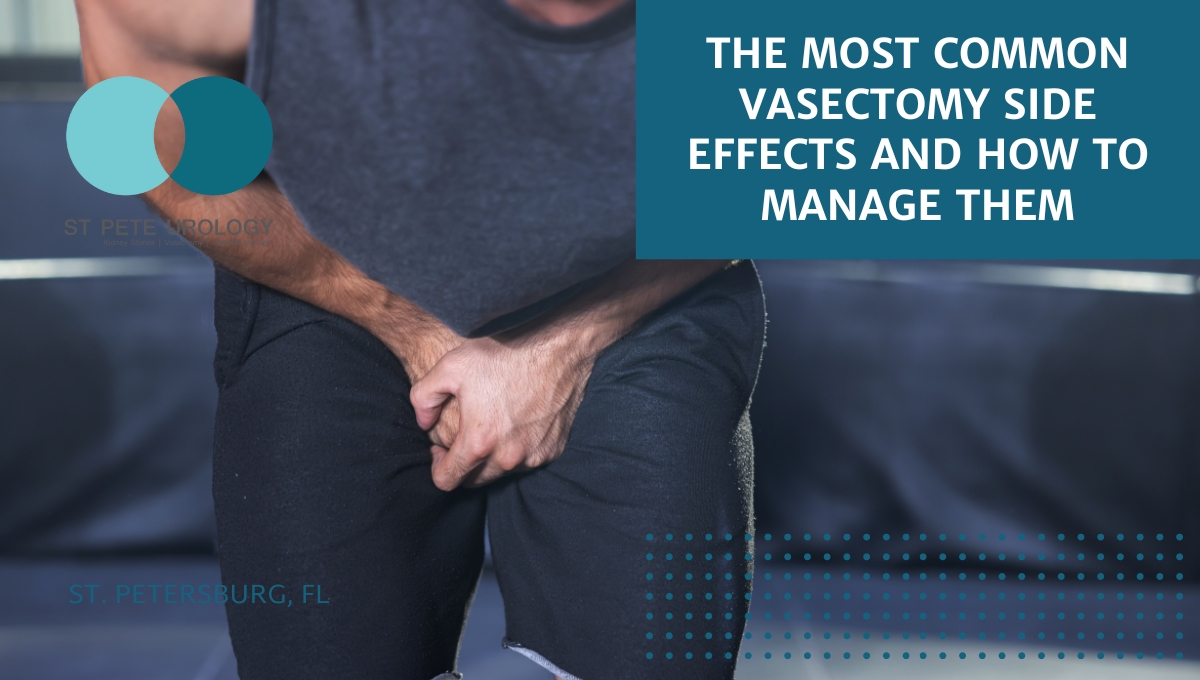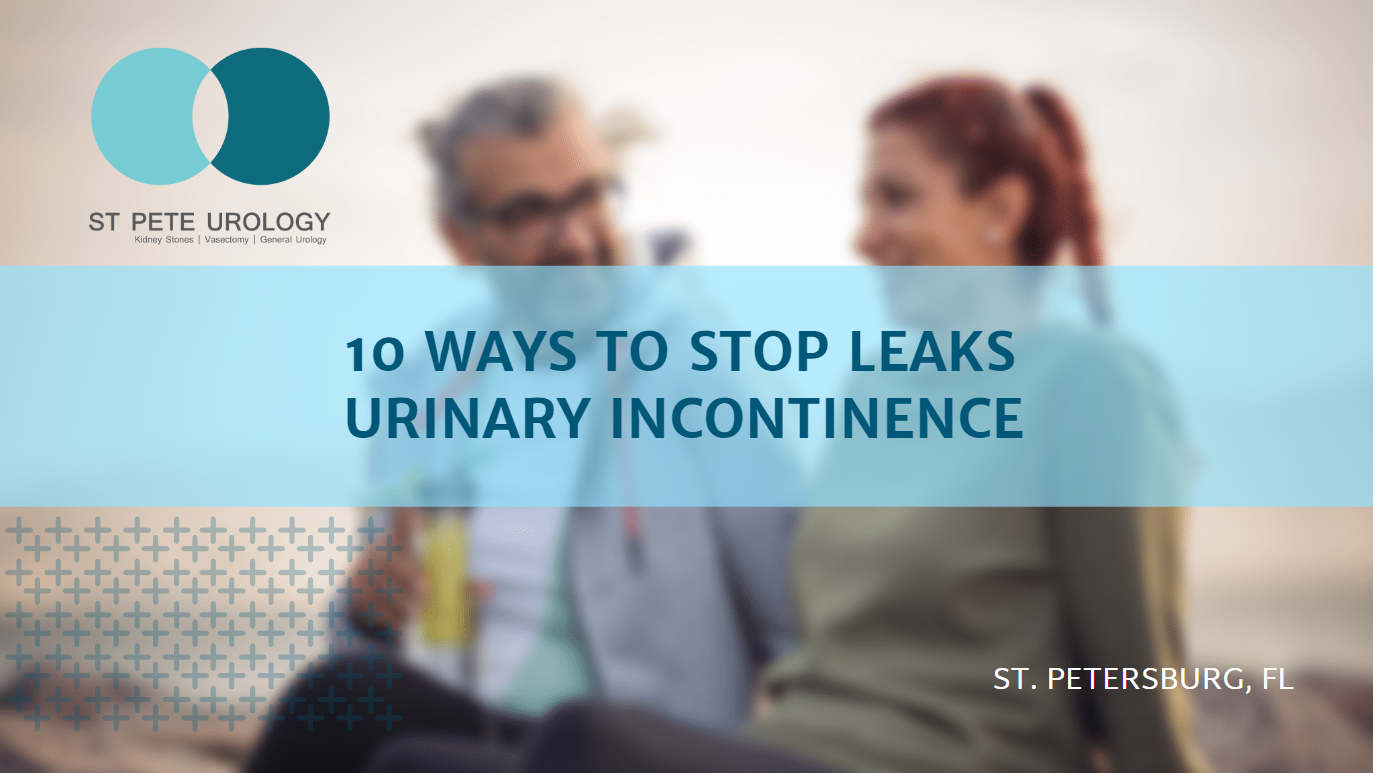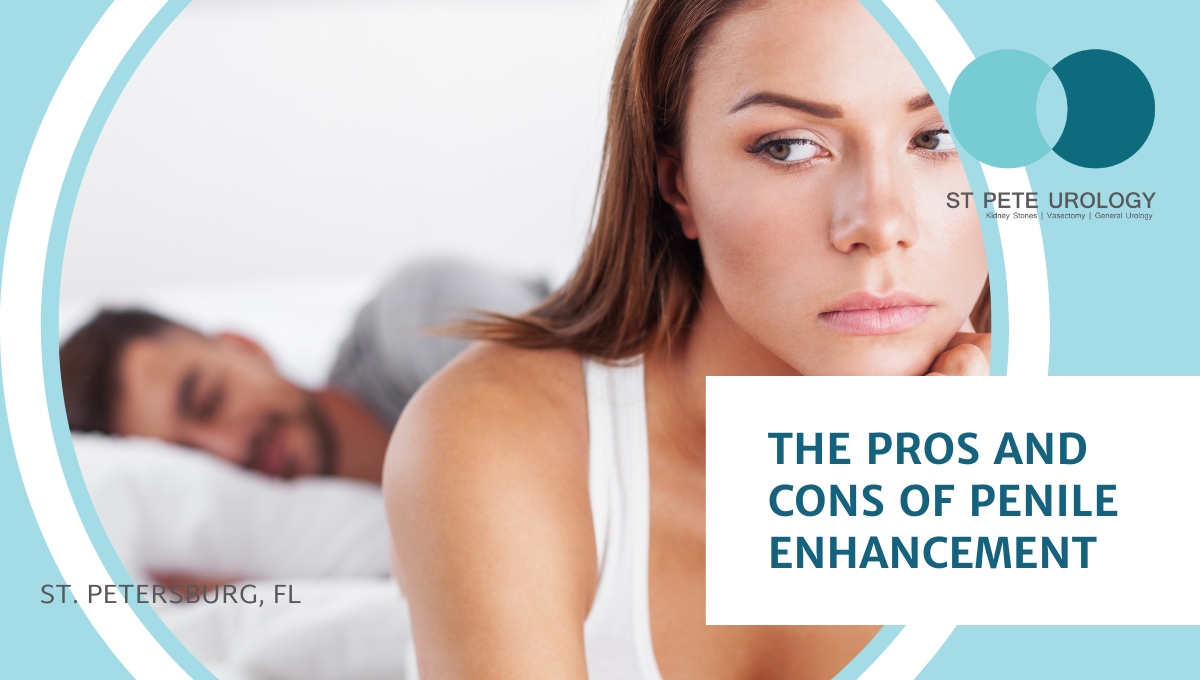Key Takeaways:
1. Common side effects of a vasectomy include post-operative pain, swelling, and bruising and can usually be managed with ice packs, taking over-the-counter medications, and following post-operative instructions for activity levels.
2. Potential complications of a vasectomy include infection and painful intercourse so if any of these symptoms persist or worsen, it is important to contact a doctor as soon as possible.
3. At St Pete Urology, our team provides quality care and support to ensure that patients achieve their reproductive goals.
Introduction
 Many males may view a vasectomy procedure as the simplest means to prevent future pregnancies. This can ensure that children are not born into their lives. However, it’s crucial to recognize that vasectomies can be associated with certain side effects. While a vasectomy might be the optimal choice for some couples, it’s essential to consider these potential side effects. In this article, we will discuss the most common vasectomy side effects and how to manage them.
Many males may view a vasectomy procedure as the simplest means to prevent future pregnancies. This can ensure that children are not born into their lives. However, it’s crucial to recognize that vasectomies can be associated with certain side effects. While a vasectomy might be the optimal choice for some couples, it’s essential to consider these potential side effects. In this article, we will discuss the most common vasectomy side effects and how to manage them.
Definition of a Vasectomy
A vasectomy is a surgical procedure performed on a man in order to prevent future pregnancies. This is done by cutting and blocking the vas deferens, which is the tube that carries sperm from the testicles to the penis. Vasectomy is considered to be a permanent form of birth control. However, it is important to note that some cases have resulted in pregnancies following the procedure.
Common Side Effects
Post-operative Pain
One of the most common side effects after a vasectomy is post-operative pain. This pain can range from mild to severe and is usually felt in the area around the scrotum. This pain should not persist for more than one week following the surgery. Typically, it can be managed by taking over-the-counter pain medications or using an ice pack.
Swelling
Swelling is another common side effect following a vasectomy and is usually localized to the scrotum and groin area. This side effect is often seen soon after the surgery and can last anywhere from a couple days to a week. Most cases can be managed with elevating the area and using an ice pack or cold pack, however, if the swelling persists and is accompanied by pain, a doctor should be consulted.
Bruising
Bruising is another common side effect following a vasectomy and is usually localized to the scrotum and groin area. This side effect is often seen soon after the surgery and can last anywhere from a few days to a couple of weeks. Bruising can be managed with over-the-counter medication, however, if the bruising persists, a doctor should be consulted.
Diagnosing and Managing Side Effects
Visit a Doctor for Post-operative Care
It is important to visit a doctor for post-operative care following a vasectomy. A doctor can provide individualized advice for managing common side effects and prescribing any necessary medications. Doctors can also provide advice for activity levels, as too much activity too soon following the procedure can increase the risk of complications.
Use Ice Packs and Over-the-Counter Medications for Pain Relief
To help manage post-operative pain, it is recommended to take over-the-counter pain medications or use an ice or cold pack. This can help reduce the pain and inflammation in the area. It is important to not take more than the recommended dosage for any over-the-counter medications and to follow all directions when using an ice or cold pack.
Follow Post-operative Instructions for Activity Levels
In order to reduce the risk of complications following a vasectomy, it is important to follow post-operative instructions for activity levels. This may include avoiding strenuous activities or activities that involve lifting for a certain period of time. Following these instructions can help ensure that any side effects are minimized and that the surgery is a success.
Potential Complications
Infection
Infection is a potential complication that can occur after a vasectomy. This can present as redness, swelling, and pain in the area that persists beyond the normal post-operative period. If infection is suspected, it is important to contact a doctor as soon as possible in order to get the appropriate treatment.
Painful Intercourse
Painful intercourse is another potential complication that can occur after a vasectomy. While it is rare, it is important to be aware of this potential complication. If a man experiences pain during intercourse that persists or worsens, it is important to contact a doctor as soon as possible.
Conclusion
In conclusion, it is important to be aware of the most common vasectomy side effects and how to manage them. Post-operative pain, swelling, and bruising are the most common side effects after a vasectomy and can usually be managed with ice packs, taking over-the-counter medications, and following post-operative instructions for activity levels. It is also important to be aware of the potential risks of infections and painful intercourse. If any of these side effects persist or worsen, it is important to visit a doctor as soon as possible.
At St Pete Urology, we understand that a vasectomy can be an overwhelming decision and we are here to provide patients with the best possible care. Our experienced staff is dedicated to providing the highest quality of care in a comfortable and welcoming environment. Contact us to learn more about how we can help you achieve your reproductive goals.
Sources:
- “Post-vasectomy pain syndrome”, MayoClinic, https://www.mayoclinic.org/diseases-conditions/post-vasectomy-pain-syndrome/symptoms-causes/syc-20527047
- “Assessing pre- and postoperative activity levels with an accelerometer: a proof of concept study”, NCBI, https://www.ncbi.nlm.nih.gov/pmc/articles/PMC5427573/
- “Review of Vasectomy Complications and Safety Concerns”, NCBI, https://www.ncbi.nlm.nih.gov/pmc/articles/PMC8255399/



 Understanding the Vasectomy Procedure: What You Need to Know
Understanding the Vasectomy Procedure: What You Need to Know
 The prostate is a small, walnut-sized gland that forms part of the male reproductive system. It sits right below the bladder and surrounds the top portion of the urethra.
The prostate is a small, walnut-sized gland that forms part of the male reproductive system. It sits right below the bladder and surrounds the top portion of the urethra.
 If so, you need immediate antibiotic treatment—
If so, you need immediate antibiotic treatment—
 A low sperm count, also known as oligospermia, can be an indicator of male fertility issues. In order to help correct this condition, there are several steps that can be taken.
A low sperm count, also known as oligospermia, can be an indicator of male fertility issues. In order to help correct this condition, there are several steps that can be taken.
 The bladder is a hollow organ located in the abdomen that temporarily holds urine produced by the kidneys. As the bladder fills with urine, nerve signals are sent to the brain, which causes the urge to urinate. These signals from the brain coordinate the relaxation of pelvic floor muscles and urethral sphincter muscles. Then, it directs the bladder muscles to contract and expel urine through the urethra.
The bladder is a hollow organ located in the abdomen that temporarily holds urine produced by the kidneys. As the bladder fills with urine, nerve signals are sent to the brain, which causes the urge to urinate. These signals from the brain coordinate the relaxation of pelvic floor muscles and urethral sphincter muscles. Then, it directs the bladder muscles to contract and expel urine through the urethra.


 Urine leaks due to urinary incontinence can be stressful and embarrassing.
Urine leaks due to urinary incontinence can be stressful and embarrassing. 
 Penis enhancement surgery is a procedure to correct structural and functional problems of the penis. It may be recommended after an injury, defect, or loss of function. But usually, it is a corrective measure for a micropenis or a buried penis. Both of which cause functional issues with urinating, sexual intercourse, or hygiene.
Penis enhancement surgery is a procedure to correct structural and functional problems of the penis. It may be recommended after an injury, defect, or loss of function. But usually, it is a corrective measure for a micropenis or a buried penis. Both of which cause functional issues with urinating, sexual intercourse, or hygiene.
 You can contract a urinary tract infection (UTI) at any point in your life. A urinary tract infection refers to entry of bacteria into the urinary tract via the urethra and then the subsequent multiplication and spreading to the urinary system, which leads to illness. The three most common UTIs are cystitis, urethritis, and pyelonephritis.
You can contract a urinary tract infection (UTI) at any point in your life. A urinary tract infection refers to entry of bacteria into the urinary tract via the urethra and then the subsequent multiplication and spreading to the urinary system, which leads to illness. The three most common UTIs are cystitis, urethritis, and pyelonephritis.